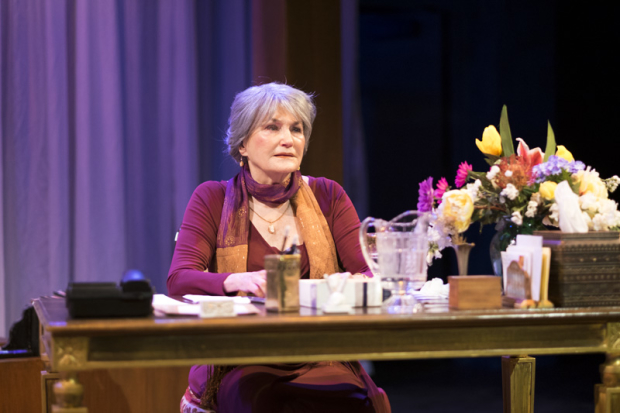Sotto Voce

(© Ava G. Lindenmaier)
In 1939, the German ocean liner St. Louis left Hamburg with over 900 passengers on board, many of them Jews fleeing the Nazi regime. The tragic aftermath of the voyage triggered Sotto Voce, a play by Nilo Cruz now onstage at Shakespeare & Company.
The ship's destination was Havana, but only 22 of the Jewish immigrants were allowed to land, and those who remained aboard were not permitted to disembark in nearby Miami, either. The St. Louis was forced to return to Europe where the refugees found safe havens — for a while. However, 254 of the original passengers perished when the Nazis overran the continent.
Cruz's memory play takes place largely in the mind of Bernadette Kahn (Annette Miller), an Aryan German who last saw her Jewish lover, Ariel Strauss, and his sister Nina when they boarded the St. Louis. Bernadette had intended to join them in Cuba, but she never heard from them again.
Some 60 years later, Bernadette is living in New York as a recluse, tended by her faithful Hispanic housekeeper, Lucilla Pulpo (Evelyn Howe). The play begins when a young Cuban researcher, Saquiel Rafaeli (Jaime Carrillo), contacts Bernadette to request a meeting. In his grandfather's apartment, he has found a cache of letters that Bernadette had written to Ariel and sent to Havana after the ship had departed from Germany. Saquiel is working on a reunion of the survivors of the voyage and claims he wants to feature her story as well. Although Bernadette is a famed novelist, she has not written about that period in her life. Bernadette speaks aloud to Saquiel, calling him "student," but she is unwilling to see him. They communicate only by e-mail and telephone, never face-to-face. As Bernadette listens to Saquiel's voice, she begins to believe her "student" is Ariel.
The plot shifts from reality — in the scenes between Bernadette and Lucila, and those between Saquiel and Lucilla (whom he seduces) — to fantasy when it explores Bernadette's dreams of what might have been. Director Daniel Gidron has blocked Saquiel on a small platform over Bernadette, brightening the lights when the couple imagines going out together. The tension is somewhat dissipated by moving the characters along the wide horizontal stretch of the playing space, except for the tight scenes of Bernadette at her desk, with Saquiel behind her.
The strength of the production lies in the solid portrayals by the trio of actors. Despite the poetic language of the play, Cruz leaves too many questions unanswered. We learn nothing about the reasons why Bernadette came to America, or about her private life during the long span of years, or about the true motives behind Saquiel's profound interest in her. The play ends in a confusing dream scene that offers no resolution.
Miller embodies an elegant but aging woman who is fully in control of herself, until she is transformed by Saquiel's attentions into a young girl again. Miller gives an especially moving performance in two monologues, the first about her plans to meet Ariel in Havana, followed by her description of a later entanglement with an SS soldier. Howe delivers an evocative, layered characterization of Lucilla as a pragmatic woman who truly cares for Bernadette, but who is so riveted by loneliness that she ignores Saquiel's obvious manipulations. Carrillo is a charmer as the mysterious student, conniving his way into the affections of both women.
The dark underside of Sotto Voce concerns the politics of the era, when the United States and other nations turned their backs on the plight of desperate immigrants. The issue of inhumane treatment of populations in peril is certainly relevant to our time, when many lessons from history seem to have been forgotten.











